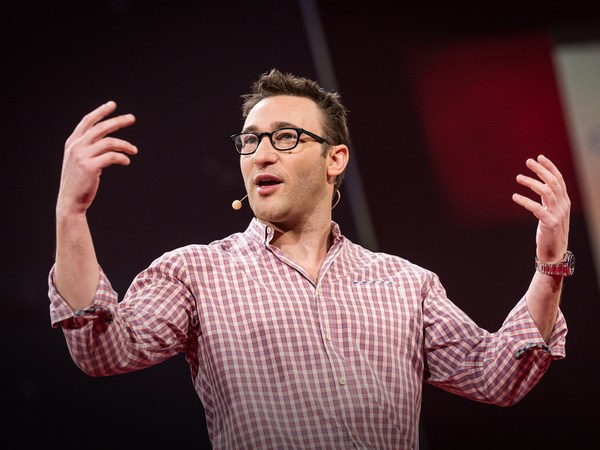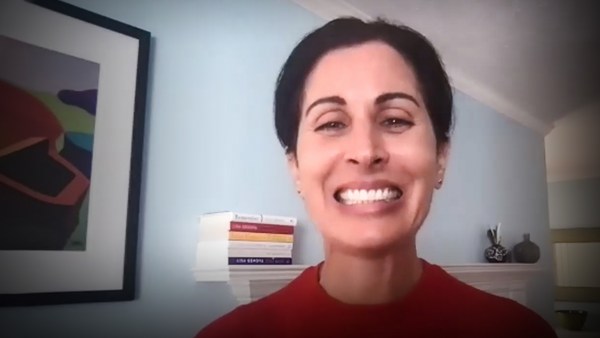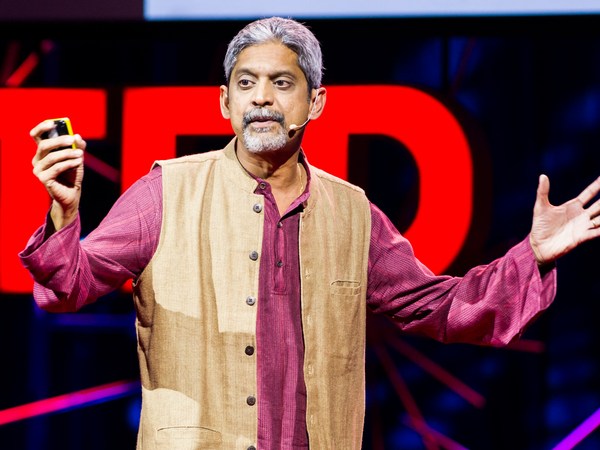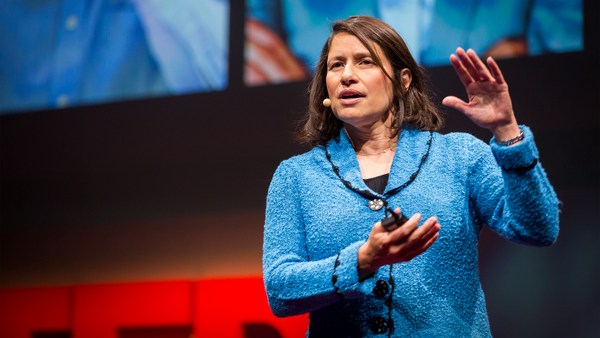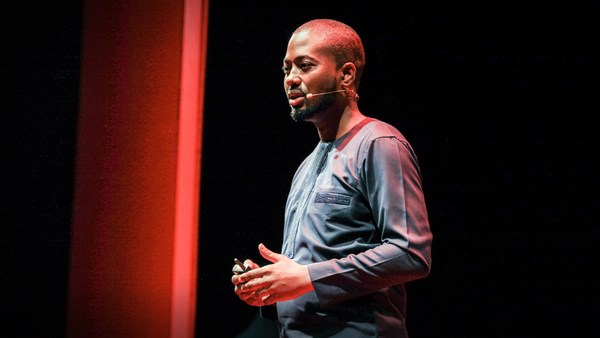Chris Anderson: Simon, I'll start us off by saying, I mean, here we are, look, after a year of the pandemic, probably one of the most extraordinary experiences any of us have had. What do you think the unexpected psychological carryovers might be? I mean, do you think we've kind of -- Part of me thinks that people have got more fragile, that it's almost like there's a sort of learned timidity. Have you seen any evidence of that or how would you characterize it?
Simon Sinek: I think we've definitely all become much more aware of mental health. And that it's a real thing and that mental health affects strong and healthy people. We all suffered trauma during COVID. Some of us dealt with it earlier, some of us dealt with it later, some of us are still dealing with it, but nobody escapes it. When COVID first started, you know, many of us had to pivot our organizations, had to pivot our businesses very quickly. And so I, like many others, we went into mission mode. And I called a friend of mine who is active-duty military. And I asked him a very simple question, how do I compartmentalize my emotions so that I can stay focused on the mission? And he gave me a very stern warning. He said, you can't. He said, we can compartmentalize our emotions for only a short period of time, but no one, no one escapes the trauma of combat. And he said, you may not even experience the trauma while you're in it, you may not experience it when you first come home, you may experience it months later. He says, I experience it four or five months after I get home. So immediately I hung up the phone and called all my A-type personality friends and said, OK, we think we're good, but we're going to get hit by this at some point. And we made a deal that when we started to feel off our game, we would call each other. Safe space. And we made another deal that there would be no crying alone. That if you had to cry, you picked up the phone and you called somebody.
Well, about four or five months into COVID, I started to feel off my game and I didn't know what was going on. And so I called that same friend in the military and I asked no leading questions. I simply asked him, tell me what your symptoms are when you suffer the trauma when you come home from combat. And he said, well, number one, he falls out of his sleep pattern. He said he starts going to bed late for no reason and doesn't want to get up in the morning. And I thought to myself, yep. He says he has some unproductive days and he comes up with an excuse like, "It's OK, you know, you deserve a rest. It's fine." But then he has another and another and another. And I thought to myself, yep. And he said he becomes very antisocial where he doesn't want to ask for help and he definitely doesn't want to talk to anybody. And I thought to myself, yep. And I realized what I was going through was trauma. And I was afraid to use the D-word, depression, for fear that that was some sort of diagnosis. I think a lot of people are afraid of that word, but that's exactly what I was going through. I was going through lowercase “D” depression. And I followed the rule that we set with our friends and I called people. Because one of the things I asked my friend is like, how do you overcome it? He said, you have to force yourself back into a sleep pattern and force yourself to call friends and ask for help.
And so I think one of the things, I think that comes out of COVID, is we recognized just the importance of human connection. You know, in this fast-paced digital world, we kidded ourselves to think that we had connections just because we were connected. But it was amazing to see when COVID started, regardless of someone's age or a technological competency, we all picked up the phone. Like, young people were talking to each other. And I think that intense craving for a human voice and human touch, I think we were reminded just how fragile we are as human beings.
CA: That phrase you've mentioned, "no crying alone," that's powerful. I mean, forgive me asking, did you cry with someone?
SS: Yes. I followed my own counsel to my friends. And when I had to cry, when I was overwhelmed, I picked up the phone and I just cried. And I had friends call me and do the same.
CA: And there was healing in that.
SS: The most important thing that came from it was that we didn't -- none of us felt alone. And there's intense safety. That amazing sense of safety that we all desire as human beings. You know, you can't feel safe when you're vulnerable, like, that's when we need it the most. But you have to build those relationships. You build those relationships in the happy times, the good times, where you think you're strong, you think you're great. It’s very hard to start building those relationships in the moment of crisis. And I think it's a lesson for leadership, quite frankly. Which is, you can't judge the quality of a crew by how a ship performs in calm waters. You judge the quality of a crew by how a ship performs in rough waters. But the time in calm waters is when you're building relationship and trust and you don't really actually know if you have trusting relationships and trusting teams and loving relationships until the crisis strikes. And I heard this from a lot of people: When COVID happened, they commented on how they realized who their real friends were. Some people kind of fell by the wayside, it was nothing personal. It's just like, we didn't call each other and we're still, you know, weren’t angry or anything. And there are some people who came out of the woodwork to check in on us and those friendships flourished. And that's what I mean. It takes hardship for those friendships and that trust to really bear fruit. But that's why we have to invest in people when we're doing well and we don't think we need anybody. And I think we forget that.
CA: What would you say to someone who has realized that they're in this moment, what's been a really difficult year, and they actually don't feel that there's someone they could, for example, pick up the phone and cry with? Is it hopeless for them until this passes? Or what would you say to them?
SS: There is an irony. There's an irony in when we need help. And when I was writing the book "Leaders Eat Last," I had the opportunity to spend some time with and visit Alcoholics Anonymous. And it is a remarkable organization. And many of us are familiar with the 12-step program. And many of us are familiar with the first step, which is admitting you have a problem. But then it's the other 11 steps that also matter. And Alcoholics Anonymous knows that if you master the first 11 steps, but not the 12th, you are likely to succumb to the disease. But if you master the 12 steps, you're more likely to overcome the disease. That 12th step is to help another alcoholic. It's service. And so there's a great irony when we need help to actually help someone who's struggling with the same thing as us. And it is the most healing thing we can do. So, you know, if we need someone to cry with, it's to offer the shoulder for somebody else to cry with. If we're feeling lonely, it's to be there for someone else who's struggling with loneliness. And this goes way beyond these subjects, which is if we're looking for love to help somebody else find love, if we're looking for the job we love, to help somebody else find the job that they love. And there's tremendous value in service.
And you hear about these things all the time, you talk to people why they chose to go in the profession they went into, especially if they're in the service profession, let's say somebody is a counselor for trauma. And you say, why did you go into this profession? "When I was younger, I suffered a trauma, and somebody was there to counsel me and I decided I wanted to commit my life to doing that for others." This is what happens with service. And we forget, just because we live in a modern world, we're actually a very old-fashioned machine. The human animal is a legacy machine living in a modern world. And we still work the same way we used to. And we desperately need each other to survive and thrive as much as we did when we were living in huts in small tribes of 150 people. And so service service is the thing.
CA: That sounds like, even for someone who's not feeling, like, depressed or at the edge right now, but a good checklist-question to ask is, is there someone I could reach out to actually, there maybe other people who are in a much worse situation and maybe there is a call I could make that would be incredibly valuable to that person and help build a relationship with future?
SS: "Are you OK?" "How are you? You know, a friend of mine, George Flynn, he says his test for a leader is if they ask you how you're doing, they actually care about the answer. And I really like that.
CA: OK, I could talk with you for hours about this, but we're going to go to some questions now. So here's a question from Kayum. "If there is no way to get back to normal," as you said, "then are we on the right path of building new normal already? Or can you help us with a blueprint that new normal should be based on?"
SS: So blueprint? No. Guidances? Yes. I think that humanity has to be -- We have to remember that humanity matters. And when I say humanity, I don't mean big-H Humanity, I mean little-H humanity, our humanity. When COVID first happened, so many leaders leaned on their humanity, whether they were effective or ineffective leaders prior to COVID, many of them picked up the phone and said, "Are you OK?" They called their teams just to check in on them. Or they called their friends to say, "Are you OK? How are you?" Well, we don't need a global pandemic to do that. That's called good leadership and we should be doing that all the time. And we should be encouraging those in our charge to do the same for those in their charge. You know, the hierarchy can still be effective that way. I hope that remains. I hope that remains. I hope the use of the telephone remains. That we don't just go back to texting all the time. I hope that putting our phones away and having family dinner remains. I think there's a lot of kids that will actually come through this with stronger relationships with their siblings if they have them, and stronger relationship with their parents because they had so much time together. And kids who may have struggled prior because they weren't getting the kind of attention they needed because their parents were so busy with work, you know, even if mom or dad are busy on a Zoom call all day, that hour that they would ordinarily just go get a cup of coffee or something, that they could focus on their kid. I think a lot of kids actually will come out of this. And kids are remarkably adaptable. They're remarkably adaptable.
CA: Here’s a question from Mariusz. "Could you give us some tips on how to discover our Why?"
SS: Absolutely. I'll give you a little exercise that you can do with your friends. It's called the Friends Exercise. Find a friend you love and who loves you. The person who, if they called you at three o'clock in the morning, you take the call and you know they would do the same for you. Do not do this with a sibling or a spouse. Do not do this with a parent. Those relationships are too close. Do it with a best friend. And go up to them and ask the simple question, "Why are we friends?" And they're going to look at you like you're crazy because you're asking them to put into words a feeling. You're asking them to use a part of the brain, the neocortex, that doesn't control feelings, and to put the thing that exists in the limbic brain into language, which it doesn't do. And so it's actually a very difficult question. They're going to say, "I don't know." It's not that they don't know, it's that they can't put it into words. Ironically, you stop asking the question why and you start asking the question, "what" because "what" is a rational question. "What is it about me that I know that you would be there for me no matter what?" And they won't know how to answer it. They'll start describing you. "I don't know, you're funny, I trust you. You've always been there for me." You play devil's advocate. "Good. That's the definition of a friend. What specifically is it about me that I know you'd be there for me no matter what?" And they'll continue to do the same. They'll keep trying to describe you. You keep playing devil's advocate. You get the idea. Eventually they'll give up and they'll start describing themselves. And they'll say, and this is what my friend said to me when I did it with them, "I don't know, Simon. I don't even have to talk to you. I could just sit in the same room as you and I feel inspired." And I got goosebumps, I'm getting them right now. They will articulate the value you have in their life and you will have some sort of emotional response, goosebumps or you'll well up, because what they're telling you is your Why, your Why is the thing you give to the world. You can do this with multiple friends and they will say almost exactly, if not the exact same thing, because that is your Why. That is the thing you give to the world. So it may not give you exact language, but it will put you squarely in the ballpark for what your Why is.
CA: Here's an anonymous question. "I have a friend who is currently struggling with depression, and he's just not like he used to be. I don't know what to say to him. He's actually annoyed by the question, 'How are you doing?' How can I offer my help?"
SS: So one of the things I learned by accident a couple of years ago is sometimes statements work better than questions. Because questions people can avoid, right? This is what we all did during COVID. "How are you?" "Fine. Fine." Everyone's fine, right? And then what do you do with that? And so try making a statement, right? Something's wrong. Something's different. You're not the same. I'm worried about you. Make statements. And it leaves very little room for somebody to divert the conversation. You're not the person I know. And do it with love and empathy and the most important thing, don't show up to solve the problem. Especially when you're starting to have a difficult conversation, you don't show up to solve the problem. You show up to create an environment in which they'd be willing to open up to you. That's the only goal. So try a statement instead of a question.
CA: So here's the last question, I'm going to ask this for me. What do you mean, Simon, when you say that everyone is a leader?
SS: Leadership has nothing to do with rank or title. I know many people who sit at the highest levels of organizations who are not leaders. We do as they tell us because they have authority over us, but we don't trust them and we wouldn't follow them. And yet I also know many people who sit at very low levels of organizations that have no formal rank and no formal authority, and yet they've made the choice to look after the person to the left of them and the person to the right of them, and we would trust them and follow them anywhere. Leadership is the responsibility to see those around us rise. It's the responsibility to take care of those around us. That's what leadership is. It's not about being in charge. It's about taking care of those in our charge. And the only thing title and authority allow you to do is lead with greater scale. Every single one of us has the opportunity to be the leader we wish we had. Every single one of us.
CA: Simon, thank you so much for spending this time with us.
SS: Thanks, Chris. I really appreciate it. Take care of yourself. Take care of each other.
[Get access to thought-provoking events you won't want to miss. Become a TED member at ted.com/membership.]
